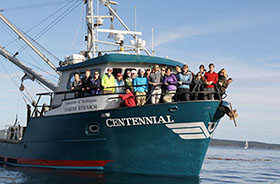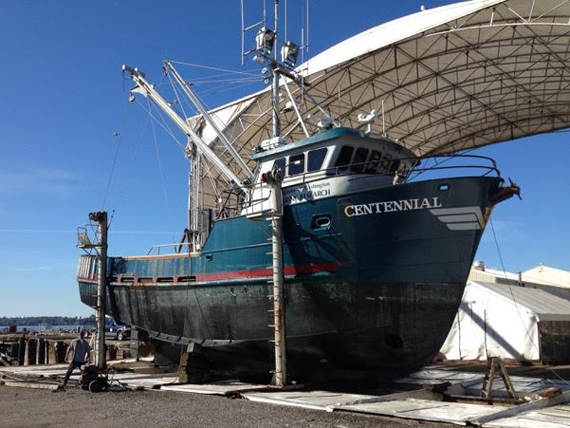Mid-Life Refit for R/V (Research Vessel) Centennial: Please help!
By Kristy Kull
 Fig. 1: A group of FHL students gathered on Centennial's bow.
Credit: Dave Haas
Fig. 1: A group of FHL students gathered on Centennial's bow.
Credit: Dave Haas
Friday Harbor Lab's 58-foot research vessel was built in 1990 and worked several Alaskan fisheries until she was purchased by FHL in 2002, converted for research, and re-christened Centennial in celebration of FHL's 100th anniversary (Figure 1). After thirteen years in the service of science, m'lady is tired: this Spring the hydrographic (data-conducting) cable broke and jeopardized $60K of water sampling equipment, and the primary generator reached the end of its (extravagantly long) life. These events, added to the rust factors that had accumulated in the nooks and crannies of a 25-year-old steel boat, made it clear that we needed to give the vessel some tender, loving care (TLC). With the support of UW Oceanography and the College of the Environment, Doug Russell (Manager of Marine Operations) and Ray McQuin (retired Captain of the R/V Barnes) came to FHL to give Centennial some close attention and advice. Their recommendations ranged from simple and extraneous fixes to fundamental/major work.
In June, Centennial went to the UW waterfront on Lake Washington to receive a replacement hydrographic cable for the one that had broken. Craig Melvin, Scott Lindgren, and Frank Silkwood took the boat through the locks to UW. Craig Melvin was hired by FHL in October 2014 as Centennial Captain. He is retired from the Los Angeles Sheriff's Department and also skippers for one of the local whale watch outfits. Scotty Lindgren was a crewman on Centennial when it was a fishing boat, and has been helping us as-needed since 2011. Scotty comes up from his home in Hoodsport, WA for our hardest, longest, and dirtiest work. And, he never complains! Frank Silkwood is a retired Seattle architect who joined our pool of relief captains this summer.
In August, Centennial went to dry dock in Blaine, WA (Figure 2) and there was a lot of major work performed in addition to the standard "shave and a haircut" (bottom paint and zinc replacement). The hull and other structural steel were ultrasounded for integrity, the entire rudder support and steering ram assembly were rebuilt/replaced, the 1,200-gallon fuel tanks were drained and inspected, and the bilge was steam cleaned. No sooner had the boat returned to FHL than it left for LaConnor, WA for more work at Latitude Marine. They did extensive welding on the mast, boom, and supporting anchor points, shifting the exhaust stack enclosure in the process to create access to the fix sites. Much of the interior insulation between decks had to be removed during welding so that it wouldn't catch fire. A blower was installed to ventilate the engine room (it now rearranges your hair for you), and the trawl winch's wire rope (which tows trawls and dredges) was replaced. FHL's Maintenance Supervisor, Fred Ellis, has put in some champion time orchestrating all of this progress.
 Fig. 2: Centennial "on the hard" in the shipyard. There's a lot of hull below the waterline which you don't normally see!
Credit: Fred Ellis
Fig. 2: Centennial "on the hard" in the shipyard. There's a lot of hull below the waterline which you don't normally see!
Credit: Fred Ellis
The next step will be replacement of the primary generator set, which serves the daily power needs of the boat and has been busted for six months now. All of this work and more were/are necessary to put Centennial back in good working order and allow us to take on fruitful work such as recovering scientific gear off the outer coast of Washington state. It's also likely that UW Seattle will need the support of Centennial for research cruises between the 2016 retirement of their R/V Barnes and the completion of its planned replacement. Ray McQuin is working closely with us this fall on the continued improvement of our boat and re-vamping the marine operations at FHL in order to build a sustainable future. Meegan Corcoran joined us this summer as an up-and-coming Centennial captain and potential manager of marine operations in the future. She's taking over the scheduling of the boat and diving into the nuts-and-bolts (and grease) with Craig and Scotty. Meegan's an 8-year Navy veteran, former FHL student, and graduate of UW's School of Environmental and Marine Affairs.
Meanwhile, FHL has spent $30,000 into approximately $100,000 of work that has to be done on the boat. The pending generator replacement will cost another $30K and is one of several big items which are critical to the boat's future. If you'd like to help keep Centennial afloat, you can donate online to FHL's R/V Centennial Operation Support Fund which provides for support and maintenance of our marine field equipment, including the boats. You can also contact Rachel Anderson, Assistant Director for Advancement at FHL, (206) 616-0760 or rachelea@uw.edu
We owe a lot to our "fleet" of volunteer skippers and crewmen, without whom Centennial couldn't function: Dennis Willows, Wolf Krieger, James Fritz, Brooke Sevier, Rich Miller, and many others. If you'd like to join the ranks, please contact Meegan Corcoran about our volunteer training program: meeganc@uw.edu



